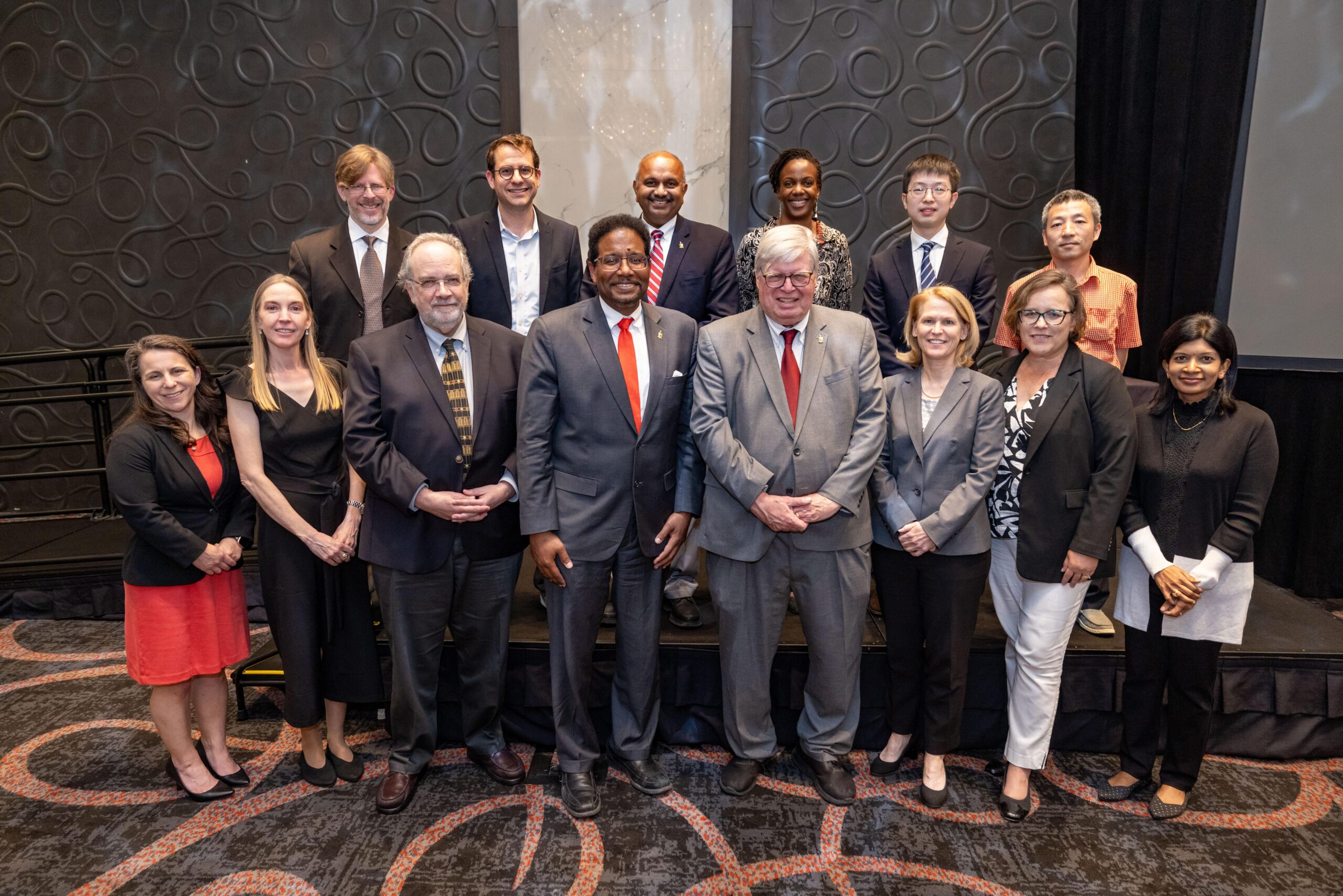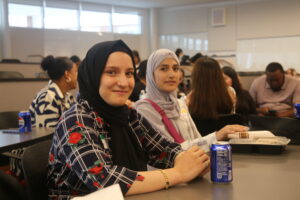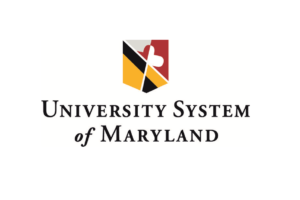Faculty Scholars and Researchers Honored at 2024 Maryland Research Excellence Celebration

Faculty scholars and researchers pictured with (center, L to R) President Darryll J. Pines, Vice President for Research Gregory F. Ball, Senior Vice President and Provost Jennifer King Rice.
Published on Division of Research website | April 18, 2024
The University of Maryland honored over 200 faculty scholars and researchers at the 2024 Maryland Research Excellence Celebration on April 16th.
Held at the Hotel at the University of Maryland and co-hosted by the Division of Research and the Office of the Provost, the event honors the distinct and notable accomplishments of University of Maryland researchers and recognizes the impact and outcomes of their work.
“Our scholarship and research contribute to society in so many ways, from fundamentally changing the way we look at the universe, to generating new insights and innovations that have a very practical impact on our lives,” said Vice President for Research Gregory F. Ball. “What underpins all of this work is a commitment to excellence.”
Also in attendance were President Darryll J. Pines and Senior Vice President and Provost Jennifer King Rice.
Addressing the honorees, Provost Rice said, “Your excellence and creativity in research and scholarship make it possible for us to reimagine learning, invest in people and communities, partner to advance the public good, and to take on humanity’s greatest challenges.”
Honorees were nominated by the deans of each school or college for demonstrably elevating the visibility and reputation of the university’s research enterprise by meeting one or more of the following criteria:
- Developing research findings that are both highly-cited and transformative to their field
- Obtaining research achievements with demonstrable societal impact, such as change in police or major external press coverage
- Achieving recognition by a national or international group
- Publishing in a renowned scholarly journal or publication in their field
- Selection for award via a funding competition with limited submissions
- Selection for a Division of Research New Directions Award
- Receiving significant external research funding from a federal funding agency, foundation, corporation, nonprofit, national laboratory, medical center, or other entity
In addition, one faculty member from each school or college was selected for special recognition as having best exemplified research excellence. Those recognized were as follows:
From the Philip Merrill College of Journalism, Associate Professor Ira Chinoy:
- Professor Chinoy did intensive research using a wide variety of previously untapped primary sources across the country to produce Predicting the Winner: The Untold Story of Election Night 1952 and the Dawn of Computer Forecasting. The book explores the contentious history of election nights as important venues in American culture for rolling out new tools for journalism, which have been met with both excitement and ridicule. The book also addresses the way forward from the events of election night 2020 and the drama that followed.
From the College of Computer, Mathematical, and Natural Sciences, Professor Hal Daumé III:
- In 2023, Professor Daumé became Director of the Institute for Trustworthy AI in Law & Society, or TRAILS for short, through a $20 million dollar NSF AI Institute award, a multi-institutional effort to transform the practice of artificial intelligence from one driven primarily by technological innovation to one that is driven by ethics, human rights, and input from communities whose voices have previously been marginalized. He is a strong advocate for equity and fairness in the design, development and deployment of AI technologies.
From the School of Architecture, Planning, and Preservation, Professor Casey Dawkins:
- Professor Dawkins published 13 impactful publications that examine various aspects of the nation’s affordable housing crisis. One line of research examines the link between housing supply and housing instability. Other work proposed novel income tax reform designed to address the nation’s affordable housing crisis. Additional publications examine the equality of opportunity and the injustices of gentrification.
From the School of Public Policy, Assistant Professor Claire Dunning:
- Dr. Dunning is the author of Nonprofit Neighborhoods: An Urban History of Inequality and the American State. The book won the Brownlow Book Award from the National Academy of Public Administration and the Outstanding Book Award from the Association for Research on Nonprofit Organizations and Voluntary Action.
From the College of Arts and Humanities, Associate Professor Shay Hazkani:
- Dr. Hazkani’s first book, Dear Palestine: A Social History of the 1948 War, was the recipient of the Korenblat and Azrieli-Concordia book awards, and long-listed for the Cundill History Prize. Shay is also the co-creator of The Soldier’s Opinion, a documentary based on his research. The film is the recipient of the 2023 American Historical Association John E. O’Connor Film Award. Dr. Hazkani’s work was reviewed in over 30 outlets in multiple countries and languages and he has been invited to discuss his work on many international stages.
From the School of Public Health, Professor Cheryl Knott:
- Dr. Knott is an MPower Professor, Co-Leader of the Population Science Program, and Associate Director of Community Outreach and Engagement at the University of Maryland Greenebaum Comprehensive Cancer Center in Baltimore. She has a long history of NIH funding, including a study focusing on the role of structural racism in creating and perpetuating cancer disparities. She also has another grant from the American Cancer Society to study individual, interpersonal, and neighborhood-level drivers of cancer disparities disproportionately impacting African Americans.
From the College of Agriculture and Natural Resources, Professor Stephanie Lansing:
- Dr. Lansing leads the Bioenergy and Biotechnology Laboratory, and currently manages over $15 million in competitive funding from NSF, DOE, and USDA. She was recently awarded $5 million from the NSF Convergence Program. Her research has examined how to divert food waste from landfills, bring surplus food to food pantries, and turn spoiled food into bioenergy or bioplastics, strengthening the bio-circular economy and providing value to wasted resources. Dr. Lansing is also a Big Ten Academic Leadership Program Fellow and Vice-Chair of the Maryland Food System Resiliency Council.
From the College of Behavioral and Social Sciences, Assistant Professor Catherine Nakalembe:
- In 2023, Dr. Nakalembe was awarded the highly prestigious Al-Sumait Prize for African Development for her groundbreaking research supporting food security in Africa. Dr. Nakalembe’s selection for this prize is a testament to her tireless efforts in leveraging satellite data to enhance agricultural decision-making and prevent the potentially devastating consequences of crop failure. Her work has directly benefited farmers by mitigating the effects of food insecurity and has also influenced the formulation of policies and programs that support these communities.
From the College of Education, Professor Laura Stapleton:
- Dr. Stapleton’s leadership in educational research has been acknowledged both in the state and nationally. In 2021, she was selected by Governor Hogan to serve a 4-year term on the Accountability and Implementation Board, overseeing the sweeping educational reforms of the Blueprint for Maryland’s Future. Over the past 5 years, she has been the director of a $2M NSF project that trains 100 early career STEM education scholars who focus on access and equity in a year-long mentorship program. Dr. Stapleton was named a 2023 American Educational Research Association Fellow in recognition of her exceptional contributions to education research.
From the College of Information Studies, Professor Mega Subramaniam:
- Dr. Subramaniam’s research focuses on enhancing the role of libraries in fostering digital literacy among underserved young people. She recently built and disseminated a new research-informed and community-driven digital literacy resource for Marylanders of all ages, with the goal of reducing the second and third level digital divides to help people develop skills required to use computers and the Internet. Her research team has developed self-paced digital literacy materials for individual use, curriculum for digital literacy providers, and training for digital navigators. Her research has been funded by various federal and state agencies.
From the Robert H. Smith School of Business, Associate Professor Kunpeng Zhang:
- Dr. Zhang has achieved exceptional research productivity with cross-disciplinary impact, and his research has appeared in top publications in both computer science and business outlets. His work is at the forefront of artificial intelligence research, focusing particularly on developing AI technologies to analyze large-scale unstructured data across marketing, finance, and healthcare sectors to empower stakeholders to make well-informed decisions.
From the A. James Clark School of Engineering, Assistant Professor You Zhou:
- Professor Zhou’s research focuses on the fundamental study of quantum materials and the development of their device applications in electronics, photonics, and energy conversion. He has been recognized as a Forbes 30 under 30, with both NSF CAREER and DOE Early Career Awards. He was also named the 2023 Outstanding Young Scientist of the Maryland Science Center, International Union of Pure and Applied Physics Early Career Scientist, and the Ralph E. Powe Junior Faculty Enhancement Award from ORAU.



